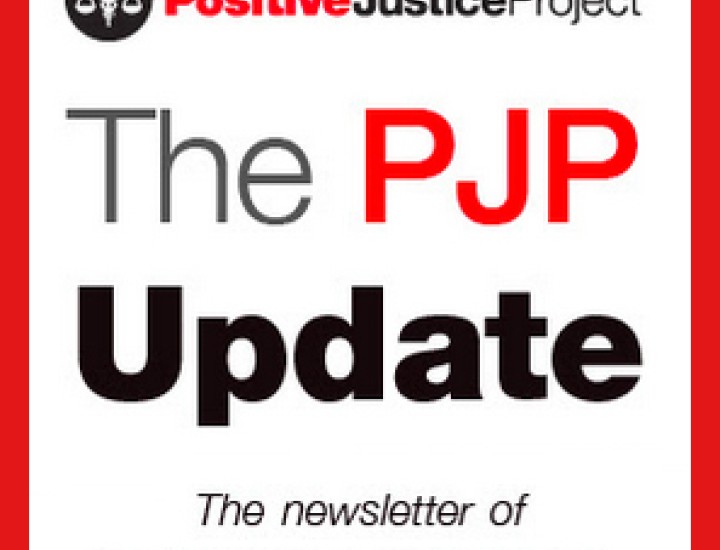

Advocacy and Action Steps on the National HIV/AIDS Strategy Updated to 2020 Since the summer release of the National HIV/AIDS Strategy Updated to 2020 (NHAS 2020), we have been in discussions and meetings with officials from the Department of Health and Human Services, the Department of Justice and the Federal Bureau of Prisons to request that they include in their NHAS action plan specific commitments to make sexual health literacy programs available to federal prisoners, to undertake steps to update the American public on the current science of HIV and STI transmission risks and routes, to more actively and widely disseminate its guidance on the reform of HIV criminalization laws, and to reconsider federal policies which stigmatize those with HIV and those at risk for acquiring it. We expect continued meetings on these requests and with federal officials at other lead agencies under the NHAS 2020. We will keep you posted. ACTION STEPSHere is a summary of the most relevant asks, endorsed by more than 80 organizations and individuals. In your meetings, letters, emails or calls with people at these agencies or at the Office of National AIDS Policy over the next couple of weeks, would you lend these simple asks your support? Each of them promise a lot of bang for very little buck. Deputy Attorney General/Department of Justice- Develop a plan and timeframe for meaningful follow-up to the Civil Rights Division Technical Assistance Guidance Best Practices Guide to Reform HIV-Specific Criminal Laws, with priority given to states with significant HIV-specific prosecutions (e.g. Missouri, Florida)
- Direct the Civil Rights Division (CRD) to disseminate its Best Practices Guide to all State Attorneys General
- Direct the CRD to disseminate the Best Practices Guide to all Offices of the United States Attorneys.
- Develop recommendations, in consultation with advocates and key stakeholders, for criminal justice reforms that eliminate the use of specific and general crimes related to consensual adult conduct, such as consensual sex work.
Department of Health and Human Services- Develop concrete plans and deadlines, including collaborations with state public health agencies, to address widespread public misperceptions about HIV and other sexually transmitted infections (STIs) (including issuance of a Surgeon General letter to the American people on HIV and STIs);
- Issue model goals, policies and plans on LGBT/HIV cultural competency training for health care professionals and students to ensure that LGBT people and people living with HIV are treated fairly and respectfully;
- Prioritize the development of guidance restricting the use of disease surveillance data for criminal law enforcement purposes; and
- Create joint policy guidance, recommendations and support for best practices and programs to reduce HIV transmission among sex workers and people who inject drugs, including a range of supportive and syringe services.
Federal Bureau of Prisons- Adopt and enforce written policies and practices supporting people living with HIV who are held under federal authority in public and private confinement and detention facilities to ensure:
- sound LGBT-inclusive and affirming sexual health care and sexual health literacy programs that include counseling about and access to condoms and other HIV/STI prevention tools; and;
- adequate medical, mental health, family and re-entry support that addresses their medical, mental health and family needs; and
- Assess and revise all policies affecting inmates living with HIV to reflect current science and to eliminate all housing or program restrictions based on HIV status (e.g., FBOP Program Statement 5214.04, “HIV Positive Inmates Who Pose Danger to Others, Procedures for Handling Of,” dated 2/4/98).

Ohio Recodification Committee Set to Review Criminal CodeOver a year ago, in June 2014, the Ohio legislature approved the creation of a 19-member Criminal Justice Recodification Committee to take a big-picture view of Ohio’s complex criminal code. The committee will be paying close attention to the mens rea of criminal offenders. The term mens rea means “culpable state of mind” – the mens rea that a criminal code provision requires has a real impact on what a prosecutor has to prove to convict a defendant, and can have an impact on the punishment. It is much easier, for example, to prove that someone was negligent or reckless than it is to prove that someone acted with the intent to do harm. The Recodification Committee will be looking at Chapter 29.01 through 29.29 of the Ohio Criminal Code to see what should be tightened up, revised or eliminated. The last review was done in 1971. The committee has two state senators, two state representatives, the state prisons director, three judges, a sheriff, municipal peace officer, three prosecutors, three criminal defense attorneys, plus representatives from the Ohio State Bar Association, community corrections programs, and addiction-services or mental-health providers. Although it is logical that there would be a hold on introduction of new criminal law bills, the same legislature that approved creation of the committee has refused to put any kind of hold on such bills. A number of the members of the Ohio Recodification Committee strongly object to the confusion and unnecessary work created by considering a massive overhaul of the current criminal code while new bills are being introduced. In fact, earlier this month the ACLU-Ohio organized a press conference calling for a moratorium on the introduction of new criminal law measures while the Recodification Committee is completing its review. The Committee work period has been extended to August 2016. Their report and recommendations are due to the Committee Chair by the end of December 2015, and it’s expected that a draft of the revised code will be available for public comment sometime in March or April of 2016. What does this mean for Ohio HIV Anticriminalization activists? Committee members have been divided up to work on different sections of the code, and two working groups are of particular relevance: the working group tackling Chapter 29.03, which deals with assault/felony assault (and where Ohio’s HIV criminal law provisions currently live); and the Chapter 29.07 working group, which covers sex offenses. Because committee members are required to accept input from experts and stakeholders, activists have a golden opportunity to get support for anticriminalization in front of the relevant working groups before their recommendations are finalized. Ohio-based criminal justice advocacy organizations agree with the ACLU, the Ohio Public Defender and others that it is important to let the committee do its work rather than jump the gun by bypassing the committee process and introducing new bills before it's finished. And with few of the committee members familiar with HIV in the context of the criminal law, clearly this is an important place to do some real HIV education in the near-term. State Advocacy Working Group Updates COLORADO Barb Cardell of The CO De-Criminalization Task Force (aka The Mod Squad) writes they are currently drafting language for a model bill to be introduced early in the legislative session that starts in January 2016. Awards & Recognition The CO De-Criminalization Task Force group (aka The Mod Squad) has been asked to join the Colorado Organizations Responding to AIDS (CORA) Announcements & Special Events The Mod Squad will be participating in the PWN USA Day of Action, mobilizing to end violence against women living with HIV on 10/23/15. Barb writes, “We feel that laws that target and stigmatizing women living with HIV lead to violence and women being trapped in violent situations.” The Mod Squad will also host their statewide HIV Is Not A Crime Institute on November 2 and 3. Iowan Tami Haught will be in town to participate. Discussion will focus on: stigmatizing language, criminalization of people living with HIV on a national and statewide front, how to shape messages, and responding to challenging statements. The CO De-Criminalization Task Force will host the Institute in Denver. Funds for travel and lodging are available. Anyone interested in attending should contact Barb Cardell at [email protected]. Next Meeting: October 27th, 6:00-8:00pm. If you are interested in joining the CO De-Criminalization Task Force group, please contact Barb Cardell at barb@barbcardell.com.
 GEORGIA GEORGIAEarlier this year the GA working group submitted a draft bill to the Georgia Department of Public Health (DPH) for consideration in the their agenda for 2016. The bill is based on the PJP’s Guiding Principles For Eliminating Disease-Specific Laws and was drafted by Steve Scarborough, an Atlanta criminal defense attorney, and Mayo Schreiber, CHLP’s Deputy Director. Executive Director of Georgia Equality, Jeff Graham, met with DPH officials in early October and while DPH supports HIV Modernization, it decided not to adopt the draft bill as part of its policy agenda.
As a result, the GA group is planning to move forward on its own to introduce it in the legislature. The first phase of this plan is to schedule a meeting with the governor’s office to ask for their support. If such can be arranged, Melanie Medalle (Reproductive Justice-HIV Policy Fellow at SisterLove, Inc.), Wendy Armstrong, MD (Emory Univ. School of Medicine), Melanie Thompson, MD (AIDS Research Consortium of Atlanta) and Steve Scarborough are selected to attend on behalf of the GA group. The group hopes to have this meeting in November. Next Meeting: November 11 at 4:00pm (ET) If you would like information on HIV Criminalization or are interested in becoming an advocate with the Georgia HIV Criminalization Working Group, please contact Stephen Williams at swilliams@hivlawandpolicy.org.
 MISSOURI MISSOURI- As submitted by LaTrischa Miles of the Kansas City Free Clinic, the Missouri AIDS Task Force provided updates on HIV Criminalization to the Ryan White Planning Council on September 25, 2015. From that meeting, the issue of HIV Criminalization was brought to the attention of the Kansas City Health Commission. The Kansas City Health Commission is a mayoral-appointed board that reports to the city council and provides guidance and advice to the City's Health Department. The gathering convened to determine their 2016 proposed legislative recommendations, and the Commission wanted additional information to be able to direct their focus on what legislation to take up. It was confirmed this week by Frank Thompson, HIV Services Program Manager at the Kansas City Health Department, that as a part of their legislative priorities, the city has included HIV Criminalization in the recommendations from the Health Commission for 2016. Missouri AIDS Task Force continues to educate the community, recently presenting at the Kansas City Transitional Grant Area Comprehensive HIV Prevention and Care Planning Council.
- Jeanette Mott Oxford of Empower Missouri writes that she attended theMidwest LGBT Health Summit sponsored by the White House at Washington University on September 30. She interacted with several people employed by AIDS service organizations there. Jeanette states, “I continue to build relationships, listen and learn as we prepare to staff the re-kindled Missouri effort.”
Announcements & Special Events Dr. Fred Rottnek, Andrew Shaughnessy, and Armeldra Simpson presented a workshop called HIV Should Not Be a Crime: Facts vs Myths at the Empower Missouri 114th Annual Conference on Thursday, October 22, in Columbia, Missouri. It is hoped that those in attendance will want to join the Missouri task force that is re-forming to address the modernization of HIV laws. Since the General Assembly is in session only January through May, there have been no new laws introduced recently. If you would like information on HIV Criminalization or are interested in becoming an advocate with the Missouri HIV Criminalization Working Group, please contact Stephen Williams at swilliams@hivlawandpolicy.org.
 OHIO OHIO
The LGBT Community Center of Greater Cleveland, in partnership with The City of Cleveland and the Cleveland Community Relations Board honored Bryan Jones with the 7th Annual LGBT Heritage Day Award for Community Advocacy. One of the ways Bryan works for his community is through his work to fight HIV Criminalization. He will host a meeting with the Positive Justice Project for the Ohio HIV Criminalization Working Group.The HIV Criminalization working group will meet November 9 at 3:30-5:30pm in Cleveland. Details of this meeting will be sent out shortly. The discussion will include the current law, why it needs to be changed, how advocates can expand the network of activists supporting change, and how to work with the Ohio Criminal Justice Recodification Committee on recommendations to modernize Ohio's HIV criminal law.If you are interested in information about HIV criminalization or actively participating in the Ohio working group, please contact Stephen Williams at swilliams@hivlawandpolicy.org.
 TENNESSEE TENNESSEE
The Tennessee working group members held their monthly meeting on September 30. They discussed the PJP Guiding Principles as a first step to developing draft legislation for introduction to the legislature in 2016. On October 22, Scotty Campbell, the new Director of Public Policy for Nashville Cares, moderated a call exploring what needs to be changed in existing Tennessee law. Allison Nichol, CHLP Co-Director, talked about Tennessee law as it relates to the The Department of Justice's Best Practices Guide to Reform HIV-Specific Criminal Laws to Align with Scientifically-Supported Factors. The group is now beginning work on a draft bill. The Tennessee legislature has a process whereby a bill may be introduced in one session, and not be up for a vote until the next session, a process that the Tennessee advocates are considering.
Next Meeting: October 27, 2015 at 11:00am (CT)
The November and December meetings are tentatively rescheduled for November 18 andDecember 16 due to the holidays. Dates to be confirmed at the October meeting.
If you are interested in information about HIV criminalization or actively participating in the Tennessee working group, please contact Stephen Williams atswilliams@hivlawandpolicy.org.

CHLP assists criminal defense attorneys in HIV exposure/transmission cases. We are providing help in cases in Missouri, Florida, Indiana, New York, Ohio and Oklahoma. Among the cases we currently are involved in are the Michael Johnson and Nushawn Williams cases in Missouri and New York. Our assistance includes counseling defendants and their families, referring defendants to attorneys, providing legal and trial strategy advice to defense attorneys, referring medical and scientific experts, drafting sections of court submissions, and submitting amicus briefs.
If you are aware of anyone charged in an HIV exposure or transmission case, please refer them to our website, www.hivlawandpolicy.org and/or have them or their lawyer contact CHLP (212-430-6733) for assistance. Calling All True Believers! Take Action! |





 GEORGIA
GEORGIA MISSOURI
MISSOURI OHIO
OHIO TENNESSEE
TENNESSEE
